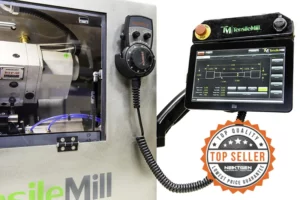
It is extremely important to have samples ready for tensile testing. Make sure the samples you have, are prepared as accurately as possible if you want accurate results.
For your benefit, there are numerous approaches to creating sample materials for a test. The tensile sample preparation lathe system is one of the sample preparation techniques that each lab will employ.
So how do you use this way of preparation? What should you plan for and keep in mind? There are several things to take into account in order to pull off this strategy successfully.
The System
Get acquainted with the tools you’ll use for any preparation method you choose to use before doing anything else. Your machine will be something like the NextGen’s TensileTurn CNC – Industrial Upgrade Model, which is suited for preparing round tensile samples. This machine can carry out a variety of operations, including cutting, drilling, sanding, turning, knurling, and facing. It was specifically created to test materials with round, angled, and three-dimensional surfaces.
The NextGen’s TensileTurn CNC – Industrial Upgrade Model, can handle a variety of specimens, from materials that are typical sizes to those that are no bigger than a button or pinhead. Additionally, it can process materials with varying degrees of stress, integrity, and shape tolerance.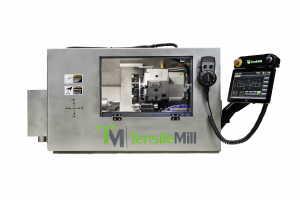
So, how is the NextGen’s TensileTurn CNC – Industrial Upgrade Model an appropriate round tensile sample preparation equipment? The answer lies in its components which include the following:
- A 2.2 KW motor
- A 3-Jaw Universal Chuck which can be manually operated
- A tailstock center
- A coolant tank that can store as much as 25 liters
- A stock capacity ranging from a 1-inch diameter to 6 inches with upgrades
Additionally, each NextGen’s TensileTurn CNC – Industrial Upgrade Model can be customized with attachments to handle particular material types more effectively. Having these items can make your job a little bit easier if your laboratory frequently deals with specimens with uneven stocks or has to prepare custom specimens.
How do you operate the NextGen’s TensileTurn CNC – Industrial Upgrade Model? A controller that comes with the equipment can be manually adjusted to meet your unique material testing procedure. A touch-screen interface on the machine’s controller makes setup and use simple. It is driven by Carbon Software, which was created to make it simple to carry out the common sample preparation procedures and produce reliable results.
How the machine manages to accurately calibrate itself in every operation is made possible through a built-in central processing unit that has the following features:
- Storage capacity up to 64 gigabytes
- Up to 4 gigabytes of RAM capacity
- USB port compatibility
- Connectivity to Wi-Fi and Ethernet devices
- Macro B enabled programming
- Work offsets with up to 126 options
- Tool offsets with up to 254 options
- Helical interpolation capability
In addition to these capabilities, the Carbon software preinstalled on the NextGen’s TensileTurn CNC – Industrial Upgrade Model may be set up for more specialized round tensile sample preparation operations like drilling through programmed cycles, trajectory planning, scaling, mirroring, and dual cutter procedures.
The system’s access to a database of Common Standards is an essential component of its correctness. As a result, the NextGen’s TensileTurn CNC – Industrial Upgrade Model is compatible with the ASTM E8 set of standards as well as well-known industrial standards like ISO, DIN, and JIS. Naturally, you may manually update the program so that the system complies with the most recent versions of these requirements.
System Operation
The NextGen’s TensileTurn CNC – Industrial Upgrade Model, is a rather simple process to use. Any operator, regardless of their level of machine experience, can make the most of their tests in every operation thanks to the machine’s thoughtful design.
The stages involved in each round tensile sample preparation machine procedure will be the same. To calibrate the machine, the operator first uses the touch screen. Here, they have two choices. They first have the option of manually setting the dimensions for that specific exam or selecting their chosen dimensions from the library of common standards.
The operator must then be loaded into the machine when it has been correctly configured. Pre-test preparations, including cutting, polishing, and drilling, must be done depending on the type of material being tested. On the other hand, because the NextGen’s TensileTurn CNC – Industrial Upgrade Model was made to deal with a variety of dimensions, substantial cutting and polishing are rarely required in this situation.
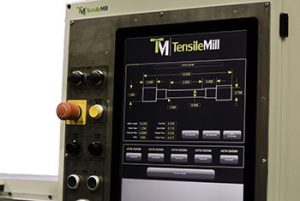
All that the operator needs to do to begin the process is load the specimen. All measurements and computations required for the testing will be made by the machine using its Carbon Software. Additionally, it is possible to set up particular task configurations to more effectively handle particular material types and dimensions.
If all goes well, there is a 90 to 100% likelihood that every operation you have on your machine will end up with accurate results, minimal mistakes, and little to zero accidents.
Tensile Sample Preparation
The threaded round specimens must first be prepared by the machine before the tensile sample preparation lathe process can start. This procedure can be completed by the NextGen’s TensileTurn CNC – Industrial Upgrade Model without the need for an outside expert. This should eliminate the waiting period you currently experience in order to obtain the appropriate dimensions for your testing samples.
On the control panel, there is a button to prepare the threaded specimen. The operator only needs to manually enter their own measurements or choose from the pre-set settings for threaded specimens. The machine and its program will next finish reconfiguring the sample to the predetermined dimensions.
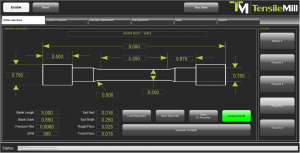
Here, the operator’s measurement planning is crucial. In addition to the size of the tester’s grips, they must take into account the size of the specimen stock and its dimensions once it has been threaded.
This step is extremely important since the specimen’s thread size must match the tester’s grips’ thread size. To be more precise, it entails ensuring that the threaded specimen’s diameter and length match the tester’s grips’ measurements.
The threaded samples themselves can also be created using a set of custom values or a common set of standards. In either case, the operator won’t have to invest much time in manually setting up their round tensile sample preparation apparatus for each testing procedure.
What Are the Advantages of Using the NextGen’s TensileTurn CNC – Industrial Upgrade Model?
As was previously said, the main objective of the NextGen’s TensileTurn CNC – Industrial Upgrade Model as a round tensile sample preparation machine is to speed up and simplify the testing process by minimizing the downtime required for sample preparation. Typically, the manufacturers would need to receive the samples from the laboratory and prepare them to fit inside the equipment.
Although the specimens are prepared as accurately as possible, the process is incredibly time-consuming, which is a drawback. It usually takes a few days to a week to package, label, and send your specimen samples to the manufacturer’s branch that is closest to you before waiting for them to be processed and shipped back. That is a ridiculously long amount of time to give for only a preparation phase. Of course, you must also take into account the strict quality controls and the potential for delays that could lengthen your waiting period.
Therefore, you can undertake this sample preparation procedure for yourself using the NextGen – Industrial Upgrade Model. This has a number of ramifications. You are first given more freedom in how you handle the round tensile sample preparation procedure. This implies that you can prepare your samples in accordance with your precise requirements and the set of standards that you typically follow.
Second, it allows you to have more control over the entire procedure. The NextGen’s TensileTurn CNC – Industrial Upgrade Model enables you to watch how the samples are being prepared in addition to the calibration phase. If you don’t like how the sample is being made, you can stop the procedure right away and start over.
Third, the device will speed up the entirety of your testing and preparation procedures. You can speed up the procedure so that you can do more tests in a week by removing the requirement to ship samples to and from your lab and the supplier.
Finally, you can cut out waste from the testing procedure. The quantity of failed specimens created in improperly calibrated round tensile sample preparation equipment is the most visible waste you can eliminate. It is simple to have the samples reprocessed with fresh parameters if you do not like their proportions.
However, downtime is a more significant waste that may be reduced, particularly if mistakes were made during the preparation stage. You don’t need to wait for the supplier to process the samples and ship them back to your plant because the machine handles the process itself.
Threading samples is simple with a tensile sample preparation lathe like the NextGen’s TensileTurn CNC – Industrial Upgrade Model. Because your operators may directly control the process through the operating settings they will enter into the machine, accuracy is also guaranteed. All that is left to do after the dimensional standards have been established is to observe as the machine automatically prepares the specimen samples.
How Optimized Will Your Work Be with the NextGen’s TensileTurn CNC – Industrial Upgrade Model?
The most important question you can have right now is if the NextGen’s TensileTurn CNC – Industrial Upgrade Model will not only work well in your facility but also enhance the standard of your testing procedure as a whole. After all, you don’t want to spend money on a device that is either too complicated to use or too unreliable.
The NextGen’s TensileTurn CNC – Industrial Upgrade Model, fortunately, was designed with long-term optimization in mind. In other words, having it in your workspace will always be advantageous to you. To do it, the machine’s design incorporates a number of elements, including:
Efficiency and Ease of Use
When it comes to the processing of round tensile samples, accuracy and precision are important. Any subsequent processes involving the sample would be at best imprecise and at worst flawed if the sample specimen’s dimensions cannot be accurately determined.
The operator’s incomplete comprehension of the machine’s operation is mostly to blame for this error. The NextGen’s TensileTurn CNC – Industrial Upgrade Model was created with an intuitive and simple-to-understand UI to handle that. It should be avoided by the operator that they waste time trying to calibrate the machine on untested numbers thanks to features like simple access to industry standards.
Long-Term Support
Any machine will eventually malfunction, and the NextGen’s TensileTurn CNC – Industrial Upgrade Model is no exception. The machine’s parts will wear down with prolonged operation, necessitating repairs and replacements.
Thankfully, the business guarantees complete support for their computers for several years after purchase. This will cover anything from simple part replacements and repairs to sophisticated software upgrades. Every time the standards themselves change, remote updates for the library of Common Standards are also available. By doing this, you can be confident that whenever you need your machine, it will be running at its best and in accordance with the most recent standards.
Efficient Tensile Preparation
When dealing with equipment for preparing round tensile samples, costs will be another important factor. Facilities could lose $100,000 to $300,000 through current methods just on sample preparation. In addition to the cost, each operation requires several hours of downtime in between phases since samples must be transported between facilities.
You may significantly reduce those operational costs with the NextGen’s TensileTurn CNC – Industrial Upgrade Model. There is no longer a need to ship the materials to another facility because the preparation may now be done internally. Additionally, this permits the fabrication of several samples at any given moment, which permits the facility to conduct more material tests.
In a technical sense, each time you use the machine, you must pay the same amount of money. Every time you use the device, though, you produce more and complete more chores. By doing this, your facility can steadily reduce its long-term operational costs.
Some Concerns
There is still space for error while utilizing the NextGen’s TensileTurn CNC – Industrial Upgrade Model, despite it being a fairly reliable tensile sample preparation lathe instrument. Although the manufacturer wouldn’t attribute this to the machine’s design (no manufacturer would ever do that, mind you), there are external elements that could have a negative effect on how the machine can be optimized.
There are two essential elements that must always be taken into account when using the NextGen’s TensileTurn CNC – Industrial Upgrade Model.
A. Operator Experience
Even though the machine was made to be used by operators of different skill levels, it works best when it is operated by a skilled individual. The NextGen’s TensileTurn CNC – Industrial Upgrade Model must be correctly calibrated for each step of the sample preparation process, so training your staff on its use is essential. Additionally, the operator needs to have a very solid foundational understanding of how to operate a lathe system.
The operators must learn how to turn on the device, use the touch screen interface, and navigate the Common Standards library during training. Additionally, and maybe more crucially, they must learn how to maintain their round tensile sample preparation machinery.
Your machine will experience considerable stress whenever it is in operation, which cannot be avoided. A skilled user will know how to use the machine while putting the least amount of strain possible on its internal parts. The difference in the machine’s longevity, measured in months or years, depends on how well-trained your employees are.
B. Off-Site Support
When it comes to preventive maintenance, you might also need to contact the manufacturer’s facility that is the closest to you so they can help you with your machine. The machine could malfunction in the middle of operation, and the damage would be too severe for you and your employees to handle. You can minimize downtime by working with a service team to bring your NextGen – Industrial Upgrade Model machine back in working order.
Assistance with sample preparation is very important and should be provided. The round tensile sample preparation procedure can be completed internally using the NextGen’s TensileTurn CNC – Industrial Upgrade Model. However, it’s possible that your facility lacks the tools required to carry out the steps that get your products ready for the procedure. Worse yet, you might not have the tools necessary to thread your samples through the apparatus.
Therefore, in order to prepare the samples, you might still need to ship your materials to a facility away from your location. Your production costs will go up, and there will be some downtime as a result.
If you find yourself facing this situation, you need to get hold of the nearest facility of the manufacturer as soon as possible. Their assistance is crucial in making sure that you can get to use the device in the first place.
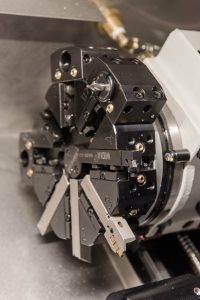
Warranty and Support
When you give it some serious thought, the calibre of your round tensile sample preparation tools will have an impact on your revenue. This means that the machine you decide to buy must produce precise results, improve the facility’s overall efficiency, and remain functional for as long as it is practical.
You should look for a computer with a trustworthy guarantee because of this. For its part, the NextGen offers a 12-month guarantee period.
The maker always views machine investments in the broadest terms imaginable. Therefore, nobody with a rational mind would spend hundreds of dollars on a machine and anticipate that it would serve its purpose for just a few years. They would want that machine to do its job for at least a decade.
This is due to the simple fact that a single tensile sample preparation lathe device or something comparable is pricey. That entails purchase costs ranging from a few hundred dollars to thousands of dollars, depending on the model. Therefore, updating such machines frequently every few years would need repeated expenses that would add up over time.
In addition, you should take into account the fact that it will be expensive and time-consuming to continually adapt your systems to new equipment. Make sure your machine can either follow the established process flow in your workplace or is compatible with other gadgets. Of course, with each replacement you deploy, you’ll need to retrain your operators on the new systems and databases.
Overall, it will be costly for your company, in the long run, to continually replace outdated testing equipment with new ones. The 12-month warranty that comes with the NextGen’s TensileTurn CNC – Industrial Upgrade Model helps to prevent that by guaranteeing that your machine will be taken care of, including preventative maintenance, significant repairs, software upgrades, and part replacements.
Depending on your circumstances, the 12-month warranty and its coverage may also be extended. As soon as you buy your equipment, you may set up your individual warranty, and everything will be recorded in writing. In this manner, all you need to do to activate the warranty is get in touch with the manufacturer, provide them with the necessary information, and then wait for the service team to show up at your facility.
However, there is a major caveat: for the warranty to last as long as possible, you must never modify, willingly damage, or modify your machine. Any attempt to modify and abuse your machine will automatically terminate your warranty, and you will be left with a defective device.
The Bottomline
The NextGen’s TensileTurn CNC – Industrial Upgrade Model is unquestionably a piece of sturdy equipment that can effortlessly fit into any round tensile sample preparation procedure. The NextGen’s TensileTurn CNC – Industrial Upgrade Model is ready to speed up the pace at which you can finish your materials testing without compromising quality or safety, thanks to an intuitive control interface, connectivity to a large library of Common Standards, and the capacity to thread samples on its own.
Until one is quickly incorporated into your operation, you won’t know what the machine is truly capable of. Click here to request a personalised quote!